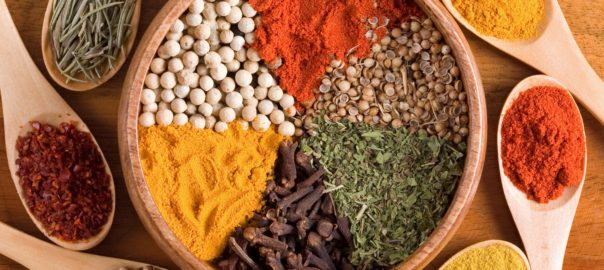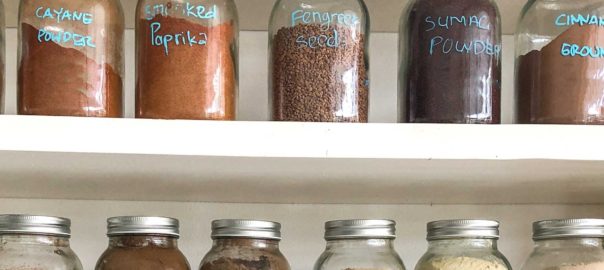There’s nothing worse than being in the middle of a recipe and realizing you’ve run out of something. Or you go to the grocery store to buy supplies and they’re out of whatever it is that you need.
While the best option is to have a Preparedness Pantry, the good news is there are ways to make substitutions so you’re not caught in a lurch. Some of these substitutions come in super handy simply because you can save money by easily substituting one spice for another. For example, I never buy chervil or mace, which tend to be more expensive, and use their substitutes instead. And sometimes making a blend yourself allows you to modify a blend to your personal preferences.
Here are some of my favorite ways to replace spices. Where the recipe does not give a measurement it simply means the substitution is to use and equal amount of the other spice. All spices listed are either dried or powdered.
Spice Substitutions
- Allspice: 1 tsp ground cinnamon + ½ tsp ground nutmeg
- Cardamom: ground ginger
- Chervil: tarragon or parsley
- Cilantro: parsley
- Mace: ground allspice or ground nutmeg
- Rosemary: thyme or tarragon or savory
- Savory: Thyme or marjoram or sage
- Tarragon: fennel seed
- Thyme: basil or marjoram or oregano or savory
DIY Spice Blends
- Apple or Pumpkin Pie Spice: ½ tsp cinnamon + ¼ tsp ground nutmeg + ⅛ tsp allspice + ⅛ tsp ground ginger
- Brisket Rub: ¼ cup smoked paprika + 3 Tbsp sugar + 2 Tbsp garlic salt + 1 Tbsp black pepper + 1 Tbsp onion powder + 1 tsp cumin powder + 1 tsp chili powder - This is enough for a 5 pound brisket
- Chai Tea Powder - 1 Tbsp cinnamon + 1 tsp ground cardamom + 1 tsp ground ginger + 1 tsp nutmeg - steep in black tea to make chai tea
- Chili Powder - 2 Tbsp paprika + 2 tsp oregano + 1 ½ tsp ground cumin + 1 ½ tsp garlic powder + 1 tsp onion powder + ¼ tsp cinnamon + cayenne pepper to taste
- Everything But The Bagel - 1 Tbsp dried garlic + 1 Tbsp dried onion + 1 Tbsp poppy seeds + 1 Tbsp sesame seeds + 2 tsp kosher salt
- Fajita Seasoning - 1 Tbsp chili powder + 1 tsp oregano + ½ tsp cayenne pepper + ½ tsp black pepper +½ tsp sea salt + ¼ tsp garlic powder + ⅛ tsp onion powder
- Garlic Salt: 1 Tbsp sea salt + 1 tsp garlic powder + 1 tsp parsley
- Herbes de Provence: 1 Tbsp thyme + 1 Tbsp rosemary + 1 Tbsp oregano + 1 tsp ground fennel + 1 tsp basil – if desired you can add 1 tsp culinary lavender
- Italian seasoning - 1 ½ Tbsp oregano + 1Tbsp basil + 1 Tbsp marjoram + 1 Tbsp rosemary + 1 Tbsp thyme + 2 tsp parsley
- Poultry Seasoning: 2 Tbsp oregano + 1 Tbsp parsley + 1 Tbsp sage + 1 ½ tsp thyme + 1 tsp crushed celery seed + ½ tsp rosemary + ½ tsp onion powder
- Taco Seasoning: 2 Tbsp chili powder + 1 Tbsp ground cumin + 2 tsp sea salt + 2 tsp ground pepper + 1 tsp paprika + ½ tsp garlic powder + ½ tsp onion powder + ½ tsp red pepper flakes + ½ tsp oregano
Don’t forget that spices can be a tricky thing for many people. It’s easy to buy something for a recipe and then it languishes in your kitchen forever. The next thing you know you’re trying to get what you need for a recipe and there’s an explosion of little containers when you open the door. Keeping your spices organized and being mindful about them can help you have less clutter in the kitchen.





